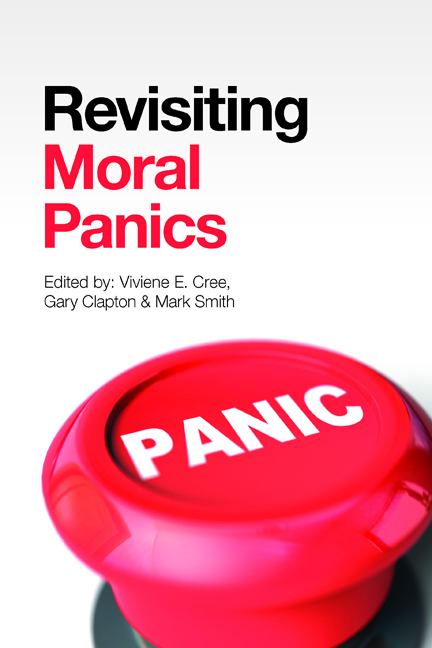Book contents
- Frontmatter
- Contents
- Contributors
- Preface
- Commentary moral panics yesterday, today and tomorrow
- Part One Gender and the family
- Part Two Moral panics in our time? Childhood and youth
- Part Three The state, government and citizens
- Part Four Moral crusades, moral regulation and morality
- Afterword the moral in moral panics
- Conclusion Moral panics and beyond
- Index
Introduction
Published online by Cambridge University Press: 08 March 2022
- Frontmatter
- Contents
- Contributors
- Preface
- Commentary moral panics yesterday, today and tomorrow
- Part One Gender and the family
- Part Two Moral panics in our time? Childhood and youth
- Part Three The state, government and citizens
- Part Four Moral crusades, moral regulation and morality
- Afterword the moral in moral panics
- Conclusion Moral panics and beyond
- Index
Summary
In common with the other parts of this book, a key theorist within the ‘moral panic’ genre is now introduced. Stuart Hall's ideas have been pivotal to the development of a more overly political analysis of moral panics. Many of his ideas are reflected in the chapters in this and the other parts, while others have been taken forward in other writing in the field.
Stuart Hall
Stuart McPhail Hall was born on 3 February 1932 in Kingston, Jamaica and first came to the UK in 1951 to study English at Oxford University, after winning a Rhodes scholarship. He described himself as a ‘familiar stranger’ at Oxford, steeped in English traditions and yet very different socially, culturally and ethnically to the other students and staff. He found politics (Marxism), and became part of the Universities and Left Review, which later merged with the New Reasoner to form the New Left Review, with Hall as its founding editor. Hall completed his MA and began a PhD on the Anglo-American novelist Henry James, before giving up his studies and moving to London, where he worked as a supply teacher in Brixton and a magazine editor. In 1961 he was appointed Lecturer in Film and Media at Chelsea College, London University; in 1964, at the invitation of Richard Hoggart, he moved to the newly formed Centre for Contemporary Cultural Studies (CCCS) at Birmingham University as its first research fellow. He remained until 1979, when he went on to become Professor of Sociology at the Open University, a post that he held until 1998.
Stuart Hall is widely acknowledged as someone who played a significant part in bringing cultural studies from the margins into the centre of academic and public analysis and debate. He collaborated with colleagues in the CCCS on a number of volumes, including Resistance through Rituals (1975); Culture, Media, Language (1980); Politics and Ideology (1986); The Hard Road to Renewal (1988); New Times (1989); Critical Dialogues in Cultural Studie (1996); and Different: A Historical Context: Contemporary Photographers and Black Identity (2001). Perhaps his best-known book, Policing the Crisis. Mugging, the State, and Law and Order (1978) was a collaboration between academics at the CCCS.
- Type
- Chapter
- Information
- Revisiting Moral Panics , pp. 133 - 136Publisher: Bristol University PressPrint publication year: 2015



